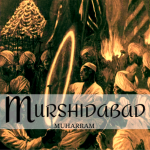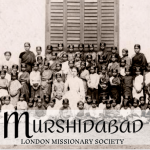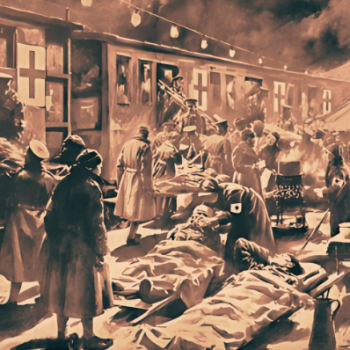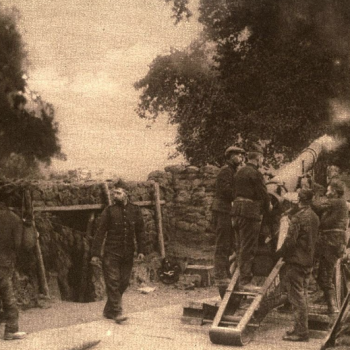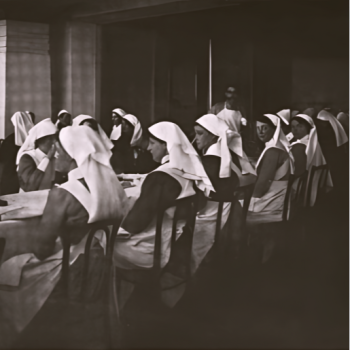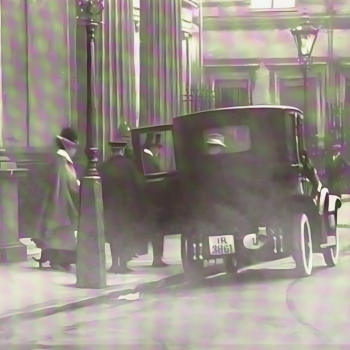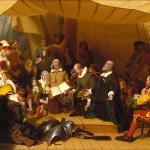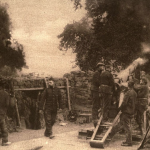THE SEQUEL OF RUBBED MOSQUITO BITES
Charles Johnston
Late September 1889
The water, soaking through the sandy soil from the high-embanked Bhagirathi, threatened to well up through the floor. We had laid our troubles before Ritchie, and he had arranged for our transfer to the dry upper story of a huge empty barrack at the corner of the square, which once housed a regiment, before Mutiny, and we were waiting for a comparatively dry day to transport our possessions. Meanwhile, Verochka was sick and sorrow-laden, We were both suffering from blood-poisoning, the sequel of rubbed mosquito bites, and Verochka was quite lamed by swollen ankles, in spite of the zinc ointment and ministrations of Surgeon-Major Nicholson, the “Doctor Sahib.”[1]
The days were exasperating; the nights were oppressive; and a point of wretchedness was added by a winged sprite which Anglo-India fitly calls the “brain-fever-bird.” It pipes up, for the most part, in the smothering nights of the rains, a sort of demon nightingale, and its cry is a melancholy “Oh-oh-oh!” descending by intervals of a fifth. It stops for a minute, until one has had time almost to forget it and sink into uneasy slumber, and then it repeats its lugubrious and heart-rending wail. “Oh-oh-oh!” which goes through one’s brain like a rusty fret-saw.
Taking it all together, we were pretty miserable, nervous, over-wrought, and wretched, in spite of the kindly sympathy of good Eugène.
One afternoon, in the midst of these detestable circumstances—a hot, steamy, muggy afternoon it was, when a breath of cold air would have been paradise—I was sitting under the punkah in a cane armchair in our big central room, and Verochka, utterly worn-out and dejected, sick, and sore, was lying down in her bedroom. I was jaded and dispirited, out of conceit with life, ready to blaspheme Mother India, and all the works of Brahma composing to myself comminations against the Bengali brother, almost lamenting that Clive had not been well licked at Plassey and the whole Anglo-Indian adventure knocked on the head. I had no wish even to read, and was gazing straight before me at the ants on the wall, in heart despondent, and in body tormented by the ceaseless stinging of prickly heat, my ankles sore and swollen with mosquito-bites.
I was half-conscious of a kind of stir among the servants who had been sitting on the front veranda looking out at the rain and, half-turning, I saw Punaswami, he of the red and gold turbans and pleading smile, hurrying toward me.
“A sadhu has come, a holy man!” he said, and backed away again to the veranda.
Looking up, I saw Gopal Baba standing near me, smiling as before, with happy luminous eyes. One of the most singular things concerning him was the way one’s servants and chaprassies and the whole host of official jackals deferred to him, falling back to let him pass, though always ready enough to browbeat and bully and bluster at humble and unprotected suppliants. But Gopal Baba could come and go like the sunshine, like the wind of the Spirit. The servants stood aside and gave him the free run of the house.
Gopal Baba met my look of inquiry with his winning smile, and before I had time to rise, seated himself on my sofa without a word on my part or on his. Had he been a government official, or a pundit, or zemindar, I should of course have risen and begged him to take a seat, and he, equally of course, would first have declined with a flourish of ceremonious hesitation, and then, on my pressing him, would have accepted. But Gopal Baba made all this very unnecessary; he waited for no invitation, and one felt that, with his high simplicity, none was needed. He came like the sunshine, welcome, not formally greeted.
Yet there was little in the outer person of Gopal Baba to impose on Poonaswami of the gold-and-red turban, save those luminous, wonderful eyes. Gopal Baba was barefoot and bare-headed, wearing, as always, but a white loin-cloth and a white scarf across his shoulders. I noticed that his hands were well-formed and sensitive, his bearing lithe and elastic; and presently I found myself dwelling on those happy, benignant eyes of his, that lit his fine face and spoke of abounding inner joy.
His eyes were the eyes of a happy, happy child, brimming over with gentle gayety. There was in him nothing solemn, or portentous, not a shade of self-importance, or self-consciousness, as who should say, “I am Sir Oracle!” The singular thing was that he said nothing at all; with the lips, at least, for the shimmering sunshine in his eyes said all things. He sat there on my sofa, in the dim room, for the sky outside was heavy with pouring storm clouds, a quiet, very serene figure, with hands decorously folded, with the gentle stillness and poise of the best Oriental manners. He sat, indeed, with the supreme unconsciousness of an angel, watching me with his gentle smile. Then, after a few minutes, during which no word was spoken, he rose, bade me farewell with his eyes, and was gone before I could rise, with that velvety, elastic step of his.
Realizing that my strange visitor was gone, I came at the same time to a realization of the strangeness of his coming, and of the wonderful atmosphere of serenity he had brought with him and, happily for me, had left behind him when he departed.
For I found a singular happiness in my heart. I looked out at the sluicing torrents of rain, the reeking mists, the water in plashing pools upon the grass, and through it all I felt the benignant light, the hidden sunshine, the sky over head, full of divinity incomparably blue. The endless worries and pains that beset us seemed small things in the face of that large serenity; discords that made the music finer. Gopal Baba had found within his heart what skylark finds when he pours forth joyful melody through the upper air; what the roses know, when breathe forth their perfume; what children feel, when they smile happy-eyed at the angels.
I went to read to Verochka and cheer her up. That afternoon, an hour or two later, we were privileged to receive the visit of a youthful Babu, Kali Prasanna Mukherji by name, who held a position in the Court of Wards, and who came highly recommended as a Bengali gentleman and a philosopher.[2] He entered with something of the air of a peacock, acridly escorted and announced by Poonaswami of the red-and-gold turban, who seemed not to approve of him.[3] Kali Babu’s beautiful name deserves to be translated. The first word denotes the god of the Iron Age, and also the one-spot on the dice. The second part means that he is altogether at peace. The third, the surname of one of the four lofty families of Kulin Brahmins, means that his emblem is the sacred umbrella.[4] So, as far as names went, Kali Babu was a very wonderful person indeed. Yet Poonaswami plainly disapproved of him.
Kali Babu saw on a little side table draped with black-and-gold Madrasi cloth, a yellow-backed copy of Tartarin de Tarascon.[5] He asked, with something of an air, what it might be. I told him, naming Alphonse Daudet.
“Oh! So you read French novels?” sniffed Kali Babu, as who should say, “Do you make a practice of burglary?”
I admitted that I did. But I saw I was fallen in the eyes of Kali Babu, fallen, fallen from my high estate. I had lost caste, and was but an outlander and a barbarian.
I accepted it quietly, however, for the charm of my visitor was still upon me. Therefore I said—
“Kali Babu, perhaps you may have heard of Gopal Baba? Tell me something of him.”
Kali sniffed at the name of Gopal Baba—just as he did at Daudet’s book.
Kali Prasanna Mukherji, Esquire, sniffed at the name of Gopal Baba, as he had at Daudet’s masterpiece, and thus unburdened his high soul—
“Oh, yes! I know him; indeed, very well. In fact, he used to teach us once; he was our guru, as we say. You know, I think, what that signifies? I will tell you. A guru is a spiritual preceptor, who stands to you in loco parentis.” I felt like adding, “E pluribus unum; Erin go bragh!” but held my peace. “But,” continued Kali Prasanna Mukherji, Esquire, “he has long ceased to hold that exalted position, except nominally. Of course we still show him respect, outwardly at least. But he does not teach us anymore. We found him not intellectual enough; not metaphysical; he never rose to the heights of dialectics. So we had to let him drop. And besides,” went on our young sage, evidently casting about in his mind for something disagreeable to say, “I have been told that he smoke opium.”
“Oh!” I replied, and let the matter drop, turning, at the instance of Kali Babu, to a discussion of the limitations of the Western mind. He would not be tempted into philosophy. I have a lurking fear that he found me unintellectual.
In due time, Kali Prasanna Mukherji, Esquire, took ceremonious leave, and strutted forth, saying in his heart, “O Vishnu, I thank thee I am not as other men; thou hast made me a Brahmin, a little higher than the angels!”
Verochka, as I have said, is of the Russian persuasion. Yet she had, even in those days, some command of our Western tongue.
“What a young ass!” she said, while Kali Babu’s fine back was still silhouetted against the sky, in the door the veranda.
At the end of the fever spell, when I began to pull together again, Verochka beguiled my convalescence by reading me Russian fairy tales. In the midst of one of them, about a wonderful golden bird, she suddenly off and said—
“Oh, do you know that Gopal Baba was here a good many times while you were ill? He used to come in and sit on the sofa without saying anything. At first the servants thought he ought to be sent away. But he was so sweetly insistent that I told them to let him be.”
Looking backward across the years, I have a fancy that there was a hidden bond between his comings and those lulls of happy quietness full of divine peace, that cooled the furnace of my fevered days; those serene hours that were like fair green islands in my dark tempestuous sea. At least I know that there was in India one man who loved the Father with his whole heart, and found in that love immeasurable joy.[6]
← Table Of Contents →
SOURCES:
[1] “Occasional Notes.’” The Englishman’s Overland Mail. (Calcutta, India) June 22, 1889.
[2] In the original text, Johnston writes: “I went to read to Mem-Sahib and cheer her up. That afternoon, an hour or two later, we were privileged to receive the visit of a youthful Babu, Kali Prasanna Chatterji by name, who held a position in the Court of Wards, and who came highly recommended as a Bengali gentleman and a philosopher.” [Johnston, Charles. “A Holy Man: Helping To Govern India.” The Atlantic Monthly. Vol. CX, No. 5. (November 1912): 653-659.] Evidence would suggest that “Kali Prasanna Chatterji” was the Theosophist, Kali Prasanna Mukerji (also a Kulin Brahmin.) First, we have a letter which Vera wrote to her family on September 23, 1889, stating: “Isn’t it funny, mamochka, that the English missionaries chose me—a Russian, and the niece of the hated H.P. B.—to be a chairwoman at their school celebration?” The letter head of the note bears the inscription of the London Missionary Society. [Johnston, V. V. “Letters of Vera Johnston,” September 23/11, 1889, entry. The letterhead is mentioned in A. D. Tyurikova’s annotations for the letters of Vera Johnston found on the website of the Bakhmut Roerich Society.] When considering that Kali Prasanna Mukerji was one of three native pastors for the London Missionary Society in Berhampore, there appears to be a connection. [Walsh, J. H. Tull. A History of Murshidabad District (Bengal): With Biographies of Some of Its Noted Families. Jarrold & Sons. London, England. (1902): 70.]
[3] Johnston states that Punaswami the elder wanted to “go home to Madras” in the summer of 1889, when Punagarami/ Maung Hkin took his position. This means that Punaswami: 1. Only made a short visit to Madras. 2. He never left at all. 3. Johnston is merging the “character” of Punagarami/ Maung Hkin with that of the elder Punaswami. This disdain for Babus is certainly in keeping with what we are told of Punagarami/ Maung Hkin’s personality.
[4] There was a distinct difference in the social and religious scaffolding in Bengal from the Hindu expression found in North India. The center of Brahmanical orthodoxy from 800 B.C.E. onward was an area between the Ganges and Yamuna rivers called Aryavarta East of that region, in present-day Bihar, was the kingdom of Magadha, where around 500 B.C.E. the Buddhists and Jaina movements were founded, and around 320 B.C.E. The creation of the Mauryan dynasty. Being even further to the east, Bengal, for many centuries, was well-insulated from the full influence of North Indian Brahmanism. Buddhism, particularly Mahayana Buddhism, held sway there long after its influence diminished in other parts of the subcontinent. Vaishnavism and Shaivism emerged in Bengal, as it did elsewhere, during the Gupta Empire (early fourth century C.E. to the late sixth century C.E.,) but Buddhist kings of the Pala Dynasty ruled Bengal up until the eleventh century C.E. According to local tradition, there were no orthodox “upper-level Hindu castes” in Bengal until the eleventh century C.E. A local king named Adisura, it was said, a member of the Vaidya caste (physician caste) of Sudra origin, grew concerned over the ignorance of the alleged Brahmans in his kingdom, so he imported four learned Brahmans and their four Sudra (servants) from Aryavarta. The four Brahmans and four Sudras became the progenitors of the four Brahman and four Kayastha clans, distinguished from the indigenous Brahmans, with the classification of “Kulina (superior) Brahmans,” and became the clans later known later known as the Mukherjis, Chatterjis, Bannerjis, and Gangulis. [Hopkins, Thomas J., and Larry D. Shinn. “The Social And Religious Background For Transmission Of Gaudiya Vaisnavism To The West.” Essay. In Krishna Consciousness In The West, edited by David G. Bromley. Bucknell University Press. Lewisburg, Pennsylvania (1989): 35-36.]
[5] 1870s novel by French author, Alphonse Daudet. [Daudet, Alphonse. Aventures Prodigieuses De Tartarin De Tarascon. E. Dentu. Paris, France. (1873.)
[6] Johnston, Charles. “A Holy Man: Helping To Govern India.” The Atlantic Monthly. Vol. CX, No. 5. (November 1912): 653-659.


